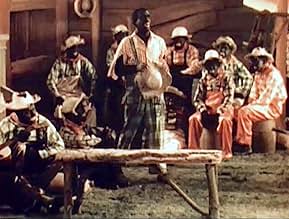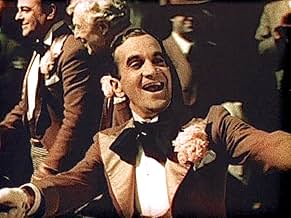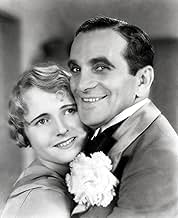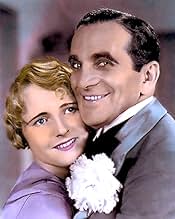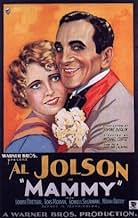VALUTAZIONE IMDb
5,8/10
251
LA TUA VALUTAZIONE
Aggiungi una trama nella tua linguaA love triangle develops in a traveling minstrel troupe.A love triangle develops in a traveling minstrel troupe.A love triangle develops in a traveling minstrel troupe.
Allan Cavan
- Doctor
- (non citato nei titoli originali)
Richard Cramer
- Detective
- (non citato nei titoli originali)
Stanley Fields
- Pig Eyes
- (non citato nei titoli originali)
Lloyd Ingraham
- Deputy Sheriff
- (non citato nei titoli originali)
Ben Taggart
- Sheriff
- (non citato nei titoli originali)
Grant Withers
- Reporter in Trailer
- (non citato nei titoli originali)
Trama
Lo sapevi?
- QuizA preserved print of this film survives in the UCLA Film and Television archives.
- ConnessioniFeatured in Hollywood and the Stars: The Immortal Jolson (1963)
Recensione in evidenza
MAMMY (Warner Brothers, 1930), directed by Michael Curtiz, became Al Jolson's fourth feature, following earlier screen efforts as "The Jazz Singer" (1927), "The Singing Fool" (1928) and "Say It With Songs" (1929). Although not one of the best in the Jolson series, the movie somewhat hits home to Jolson's early years as a minstrel man. With the songs by Irving Berlin, he is also credited with its story idea titled "Mr. Bones."
Al Jolson stars as Al Fuller, the lead singer of a minstrel show. He is hopelessly in love with Nora Meadows (Lois Moran), the daughter of the minstrel manager (Hobart Bosworth), but her real interest is in Billy West (Lowell Sherman), the interlocutor who ignores her so he can keep his eyes on other women. One night during a comedy act, Al, who is to "shoot" Westy at the close of the skit, finds Westly on the floor unconscious, and soon realizes that someone had placed real bullets in his gun. Following the performance, Al is arrested for attempted murder. When the police wagon that's carrying Al turns over, Al escapes. Bumming around in freight trains and eluding the law, he decides to pay his mother (Louise Dresser) her long-awaited visit. Knowing that something is wrong with her son, Mrs. Fuller doesn't let on, but she does gives Al her motherly advice in saying, "If anyone says anything against you, son, always MAKE THEM PROVE IT." Knowing that he is innocent of the shooting, Al decides to take her advice and go back to face the music, but when he does, he finds a different tune awaiting him.
Music and lyrics by Irving Berlin include: "Let Me Sing and I'm Happy," "Here We Are," "Who Paid the Rent for Mrs. Rip Van Winkle?" "The Knights of the Road," "Yes, We Have No Bananas" (by Frank Silver and Irving Cohn); Guiseppi Verdi's "Miserere" from Il TROVATORE; "Looking At You Across the Breakfast Table," "Here We Are" (reprise); "In the Morning," "Why Do We Take the Night Boat to Albany?" "Swanee River" (by Stephen Foster); "Let Me Sing and I'm Happy" (reprise); "To My Mammy" (sung by Jolson to Louise Dresser); and "Let Me Sing and I'm Happy" (closing number). Of all the songs presented here, "Let Me Sing and I'm Happy" comes off best, sung three times by Jolson, each in a different style.
Originally filmed in early Technicolor, existing prints today are shown in black and white. Storyline is passable, but does have its slow points, one in which Jolson's purposely stutters to a visiting sheriff (Jack Curtis) so to give the theater troupe time to take off on a train, only to learn that the sheriff isn't there to arrest anybody, but to join the company; and another when Jolson gets drunk, a scene that appears longer than what it is. Jolson's acting hasn't improved much dramatically but succeeds in perking up the plot with his energetic singing. Also featured in the cast are Tully Marshall as Slats, Al's tag-along hobo he befriends in a freight car during his escape from the law; Stanley Fields and Mitchell Lewis, among others.
Due to the controversy of the movie, mainly because of it lengthy minstrel show routines, "Mammy" is a rarity on TV, or anywhere for that matter. Currently available on video cassette, it can also be seen sporadically on late night cable television's Turner Classic Movies.(**)
Al Jolson stars as Al Fuller, the lead singer of a minstrel show. He is hopelessly in love with Nora Meadows (Lois Moran), the daughter of the minstrel manager (Hobart Bosworth), but her real interest is in Billy West (Lowell Sherman), the interlocutor who ignores her so he can keep his eyes on other women. One night during a comedy act, Al, who is to "shoot" Westy at the close of the skit, finds Westly on the floor unconscious, and soon realizes that someone had placed real bullets in his gun. Following the performance, Al is arrested for attempted murder. When the police wagon that's carrying Al turns over, Al escapes. Bumming around in freight trains and eluding the law, he decides to pay his mother (Louise Dresser) her long-awaited visit. Knowing that something is wrong with her son, Mrs. Fuller doesn't let on, but she does gives Al her motherly advice in saying, "If anyone says anything against you, son, always MAKE THEM PROVE IT." Knowing that he is innocent of the shooting, Al decides to take her advice and go back to face the music, but when he does, he finds a different tune awaiting him.
Music and lyrics by Irving Berlin include: "Let Me Sing and I'm Happy," "Here We Are," "Who Paid the Rent for Mrs. Rip Van Winkle?" "The Knights of the Road," "Yes, We Have No Bananas" (by Frank Silver and Irving Cohn); Guiseppi Verdi's "Miserere" from Il TROVATORE; "Looking At You Across the Breakfast Table," "Here We Are" (reprise); "In the Morning," "Why Do We Take the Night Boat to Albany?" "Swanee River" (by Stephen Foster); "Let Me Sing and I'm Happy" (reprise); "To My Mammy" (sung by Jolson to Louise Dresser); and "Let Me Sing and I'm Happy" (closing number). Of all the songs presented here, "Let Me Sing and I'm Happy" comes off best, sung three times by Jolson, each in a different style.
Originally filmed in early Technicolor, existing prints today are shown in black and white. Storyline is passable, but does have its slow points, one in which Jolson's purposely stutters to a visiting sheriff (Jack Curtis) so to give the theater troupe time to take off on a train, only to learn that the sheriff isn't there to arrest anybody, but to join the company; and another when Jolson gets drunk, a scene that appears longer than what it is. Jolson's acting hasn't improved much dramatically but succeeds in perking up the plot with his energetic singing. Also featured in the cast are Tully Marshall as Slats, Al's tag-along hobo he befriends in a freight car during his escape from the law; Stanley Fields and Mitchell Lewis, among others.
Due to the controversy of the movie, mainly because of it lengthy minstrel show routines, "Mammy" is a rarity on TV, or anywhere for that matter. Currently available on video cassette, it can also be seen sporadically on late night cable television's Turner Classic Movies.(**)
I più visti
Accedi per valutare e creare un elenco di titoli salvati per ottenere consigli personalizzati
Dettagli
- Tempo di esecuzione1 ora 24 minuti
- Colore
Contribuisci a questa pagina
Suggerisci una modifica o aggiungi i contenuti mancanti

Divario superiore
By what name was Nomadi del canto (1930) officially released in Canada in English?
Rispondi
